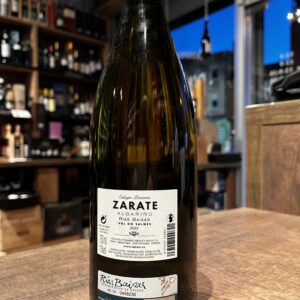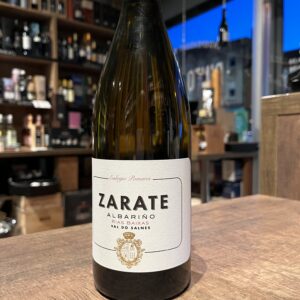-
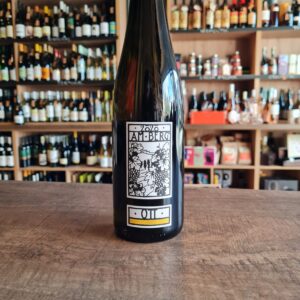 The Ott family has been growing and producing wine in the region of Wagram in Lower Austria since 1889. Bernhard Ott is of the fourth generation and has managed the winery since 1993, when he took the helm from his father. When he came home to the winery as a 21 year old, he was interested in producing wines of the highest quality. Bernhard wanted to prove that elegant and long lived wines could be produced from Grüner Veltliner grown on loess soil, specifically from Rosenberg vineyard. Bernhard replaced the old wooden casks with stainless steel and began working the vineyards with an aim for the highest high quality. In 2004 Benhard began composting, using organic cow manure from a friend in the region. In the past four years he’s used so much manure that the EU contacted him; “they didnt think it was possible to use 100,000 Euros worth of manure – they thought there was some accounting mistake. In 2006 he took a trip to the legendary biodynamic property Domaine La Romanée Conti in Vosne, with his best friend, Hans Reisetbauer. There, after a marathon tasting in the cellars with Aubert de Villaine, Bernhard committed to move to biodynamic viticulture. In 2007, with Johannes Hirsch, Fred Loimer and a group of like-minded producers, Respekt was formed. In 2014, after a very difficult harvest in which Bernhard didn’t bottle any single vineyard wines, he decided to work whole cluster saying “the stem is part of the grape. If you work without stems, you get more sweetness, more round fruit.” Today, Bernhard is looking back to previous generations for inspiration and to inform both his work in the vineyard and in the cellar. Grapes are picked at full ripeness, but thanks to biodynamic farming and composting, the sugar ripeness stays very moderate. “The compost helps with water regulation. Healthy soils give water when the weather is dry and take it back when there is too much. This also means no irrigation at all.” says Bernhard. In addition to working the soils with compost, Bernhard is a firm believer in not disrupting the eco-sysytem under the soils too much, preferring to plowing only 8cm deep. Harvest is done 100% by hand, something that is very important to note in a region who’s rolling hills and flatter landscape allow for machine harvesting. After picking and a strickt selection, the fruit is crushed in the press and maceration is done inside the press. The length of the maceration depends on the vintage, but also on the vineyard and the quality of the fruit. Bernhard uses closed pneumatic presses and has several different sizes. “This is how the press used to operate – there was only one pressing per day, so there was a maceration in the press.” explains Berhard. The juice is “browned” and racked into stainless steel where it is fermented by native yeasts without temperature control. Minimal amounts of sulfur are used at harvest and bottling and the cellar is very cold, inhibiting the development of malolactic. The single vineyard wines from the three Erste Lagen – Rosenberg, Spiegel and Stein – are on the full less until June or July before racking and bottling. The resulting wines are some of the very finest in Austria, straddling a juicy character with strong soil signatures.
The Ott family has been growing and producing wine in the region of Wagram in Lower Austria since 1889. Bernhard Ott is of the fourth generation and has managed the winery since 1993, when he took the helm from his father. When he came home to the winery as a 21 year old, he was interested in producing wines of the highest quality. Bernhard wanted to prove that elegant and long lived wines could be produced from Grüner Veltliner grown on loess soil, specifically from Rosenberg vineyard. Bernhard replaced the old wooden casks with stainless steel and began working the vineyards with an aim for the highest high quality. In 2004 Benhard began composting, using organic cow manure from a friend in the region. In the past four years he’s used so much manure that the EU contacted him; “they didnt think it was possible to use 100,000 Euros worth of manure – they thought there was some accounting mistake. In 2006 he took a trip to the legendary biodynamic property Domaine La Romanée Conti in Vosne, with his best friend, Hans Reisetbauer. There, after a marathon tasting in the cellars with Aubert de Villaine, Bernhard committed to move to biodynamic viticulture. In 2007, with Johannes Hirsch, Fred Loimer and a group of like-minded producers, Respekt was formed. In 2014, after a very difficult harvest in which Bernhard didn’t bottle any single vineyard wines, he decided to work whole cluster saying “the stem is part of the grape. If you work without stems, you get more sweetness, more round fruit.” Today, Bernhard is looking back to previous generations for inspiration and to inform both his work in the vineyard and in the cellar. Grapes are picked at full ripeness, but thanks to biodynamic farming and composting, the sugar ripeness stays very moderate. “The compost helps with water regulation. Healthy soils give water when the weather is dry and take it back when there is too much. This also means no irrigation at all.” says Bernhard. In addition to working the soils with compost, Bernhard is a firm believer in not disrupting the eco-sysytem under the soils too much, preferring to plowing only 8cm deep. Harvest is done 100% by hand, something that is very important to note in a region who’s rolling hills and flatter landscape allow for machine harvesting. After picking and a strickt selection, the fruit is crushed in the press and maceration is done inside the press. The length of the maceration depends on the vintage, but also on the vineyard and the quality of the fruit. Bernhard uses closed pneumatic presses and has several different sizes. “This is how the press used to operate – there was only one pressing per day, so there was a maceration in the press.” explains Berhard. The juice is “browned” and racked into stainless steel where it is fermented by native yeasts without temperature control. Minimal amounts of sulfur are used at harvest and bottling and the cellar is very cold, inhibiting the development of malolactic. The single vineyard wines from the three Erste Lagen – Rosenberg, Spiegel and Stein – are on the full less until June or July before racking and bottling. The resulting wines are some of the very finest in Austria, straddling a juicy character with strong soil signatures. -
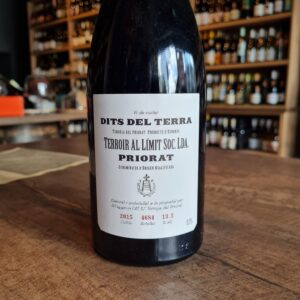 The wine Priorat Dits del Terra is a red wine produced in the Catalunya region, more precisely Priorat or the Torroja del Priorat in Spain, by Terroir al Limit. The vineyards are south facing in the sun-baked slate hills of Priorat and 60+ year old carignan vines are not usually harbingers of floral elegance and silken grace. And yet this gap between expectation and stunning creation is precisely what makes Dits de Terra so iconic. The vineyard, one of the original Terroir Al Limit holdings, honors the Cyprus trees that shade the historic Eremitas throughout the region. It is crafted using whole bunch fermentation and initial vinification in cement, then afforded a rare gift: time, in the form of 16 months in Stockinger foudres and cement, with a gentle and unobtrusive elevage. This care and attention elevates it into a fine, complex and fluid expression of different terroirs. The dark depths in the glass belie its ephemeral lightness in aroma and flavor. Breathy black fruits and a persistent herbality enhance the supple spice and suspended movement across the palate. Anise, fresh fennel and rose notes are underscored with a fluid web of balsamic accents - never weighty nor wide. The wine exudes gravitas with the elegant confidence that comes only from complete comfort in one’s own skin. Only 2000 bottles produced, Masterclass of a wine!
The wine Priorat Dits del Terra is a red wine produced in the Catalunya region, more precisely Priorat or the Torroja del Priorat in Spain, by Terroir al Limit. The vineyards are south facing in the sun-baked slate hills of Priorat and 60+ year old carignan vines are not usually harbingers of floral elegance and silken grace. And yet this gap between expectation and stunning creation is precisely what makes Dits de Terra so iconic. The vineyard, one of the original Terroir Al Limit holdings, honors the Cyprus trees that shade the historic Eremitas throughout the region. It is crafted using whole bunch fermentation and initial vinification in cement, then afforded a rare gift: time, in the form of 16 months in Stockinger foudres and cement, with a gentle and unobtrusive elevage. This care and attention elevates it into a fine, complex and fluid expression of different terroirs. The dark depths in the glass belie its ephemeral lightness in aroma and flavor. Breathy black fruits and a persistent herbality enhance the supple spice and suspended movement across the palate. Anise, fresh fennel and rose notes are underscored with a fluid web of balsamic accents - never weighty nor wide. The wine exudes gravitas with the elegant confidence that comes only from complete comfort in one’s own skin. Only 2000 bottles produced, Masterclass of a wine! -
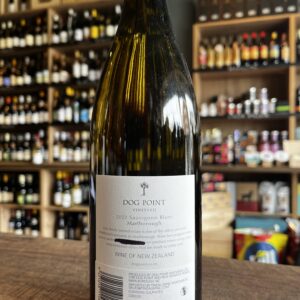
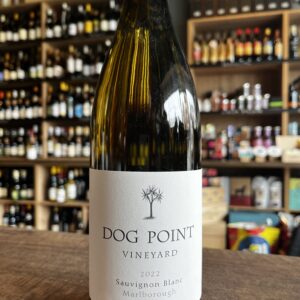 Dog Point Vineyard is New Zealand's largest certified organic vineyard by Biogro NZ. We are family owned and one of the oldest privately established vineyards, located on the hill slopes of the Southern Valleys of Marlborough, New Zealand. Marlborough is blessed with one of the sunniest and driest climates in New Zealand. The significant diurnal temperature range between cool nights and sunny days allows ideal conditions for the long slow ripening of grapes. Soils are crucial to the character of our wine. Most soils have been laid down within the last 14,000 years carved and eroded by glaciers in the high country and carried down to the coast by melt-water rivers. Older well-established vines are situated on free draining silty clay loams. This is supplemented with more recent plantings on closely planted hillside blocks on soils with a clay loam influence. Pair with fresh, simple seafood dishes especially oysters. Also compliments goat's cheese well
Dog Point Vineyard is New Zealand's largest certified organic vineyard by Biogro NZ. We are family owned and one of the oldest privately established vineyards, located on the hill slopes of the Southern Valleys of Marlborough, New Zealand. Marlborough is blessed with one of the sunniest and driest climates in New Zealand. The significant diurnal temperature range between cool nights and sunny days allows ideal conditions for the long slow ripening of grapes. Soils are crucial to the character of our wine. Most soils have been laid down within the last 14,000 years carved and eroded by glaciers in the high country and carried down to the coast by melt-water rivers. Older well-established vines are situated on free draining silty clay loams. This is supplemented with more recent plantings on closely planted hillside blocks on soils with a clay loam influence. Pair with fresh, simple seafood dishes especially oysters. Also compliments goat's cheese well -
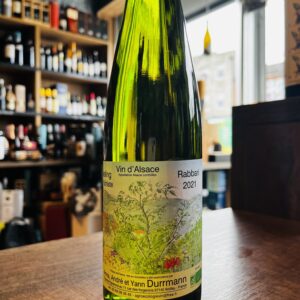 This wine is imported directly and only for Pinto Wines Riesling on Schist makes its terroir apparent with a livewire acidity and snap, rocky, chalky and mineral. Low yielding parcels. Long and driving, a little structure from 2022. The Durrmann family are making wine from their old family house in the middle of Andlau, a beautiful village nestled on the first slopes of the Vosges mountains south-west of Strasbourg. With a surface of only 1,5 hectare at the beginning in 1979, the domaine gradually reached a total surface of seven hectares after André decided to move back to farming and pieced it together from abandoned vineyard sites that were hard to work and no longer commercially viable, coming from his grandfather who made shoes to supplement the farm income. This lack of an established and family-based wine making tradition initially presented a weakness because the whole business had to be built, but it is also a strength because the company wasn’t limited to traditional customs, and therefore has always been oriented toward innovation. The vineyards are now scattered on about 30 spots around the village. They added parcels progressively when opportunities showed up and looked also for different soil qualities so that the cuvées express several terroirs. The Durrmans think that the quality of the wine is created by the work in the vineyard, that’s why their objective is its preservation. The wines are being disturbed as little as possible. They do not add any oenological product to change the natural taste of the wines. The production is partly vinified in inox tank and partly in old wooden casks. Son Yann has worked in the domaine since he was a child and officially took over the running of the business a year ago. André was among the first wave of organic winemakers in Alsace converting in 1998, Yann has then taken this a step further applying a more natural approach in the cellar. Selected cuvées are produced without sulfur addition since 2007. The Durrmanns are true eco warriors only having electric cars and using solar energy for hot water and heating. Pair it with Pork, Seafood, Curries, Spicy dishes
This wine is imported directly and only for Pinto Wines Riesling on Schist makes its terroir apparent with a livewire acidity and snap, rocky, chalky and mineral. Low yielding parcels. Long and driving, a little structure from 2022. The Durrmann family are making wine from their old family house in the middle of Andlau, a beautiful village nestled on the first slopes of the Vosges mountains south-west of Strasbourg. With a surface of only 1,5 hectare at the beginning in 1979, the domaine gradually reached a total surface of seven hectares after André decided to move back to farming and pieced it together from abandoned vineyard sites that were hard to work and no longer commercially viable, coming from his grandfather who made shoes to supplement the farm income. This lack of an established and family-based wine making tradition initially presented a weakness because the whole business had to be built, but it is also a strength because the company wasn’t limited to traditional customs, and therefore has always been oriented toward innovation. The vineyards are now scattered on about 30 spots around the village. They added parcels progressively when opportunities showed up and looked also for different soil qualities so that the cuvées express several terroirs. The Durrmans think that the quality of the wine is created by the work in the vineyard, that’s why their objective is its preservation. The wines are being disturbed as little as possible. They do not add any oenological product to change the natural taste of the wines. The production is partly vinified in inox tank and partly in old wooden casks. Son Yann has worked in the domaine since he was a child and officially took over the running of the business a year ago. André was among the first wave of organic winemakers in Alsace converting in 1998, Yann has then taken this a step further applying a more natural approach in the cellar. Selected cuvées are produced without sulfur addition since 2007. The Durrmanns are true eco warriors only having electric cars and using solar energy for hot water and heating. Pair it with Pork, Seafood, Curries, Spicy dishes -
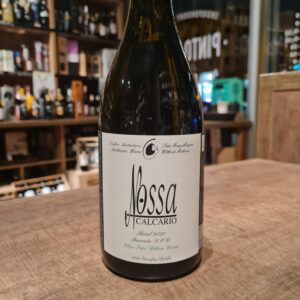 This mineral-driven white wine from Filipa Pato is akin to top quality white Burgundy. Using the Bical grape, the wine is aged in old French oak barrels and displays a great balance between creamy richness and lean minerality. Following in the footsteps in the winemaking traditions of her well-known father, Luis, Filipa Pato has now, in her own right, garnered a reputation for producing a superb range of wines in the heart of Bairrada, in Ois do Bairro. Focussing on Bairrada’s local native grape varieties, Filipa’s top-level white. It should be served not too cold, decanted into elegant glasses. It goes well with cheeses, fish dishes and salads.
This mineral-driven white wine from Filipa Pato is akin to top quality white Burgundy. Using the Bical grape, the wine is aged in old French oak barrels and displays a great balance between creamy richness and lean minerality. Following in the footsteps in the winemaking traditions of her well-known father, Luis, Filipa Pato has now, in her own right, garnered a reputation for producing a superb range of wines in the heart of Bairrada, in Ois do Bairro. Focussing on Bairrada’s local native grape varieties, Filipa’s top-level white. It should be served not too cold, decanted into elegant glasses. It goes well with cheeses, fish dishes and salads.


